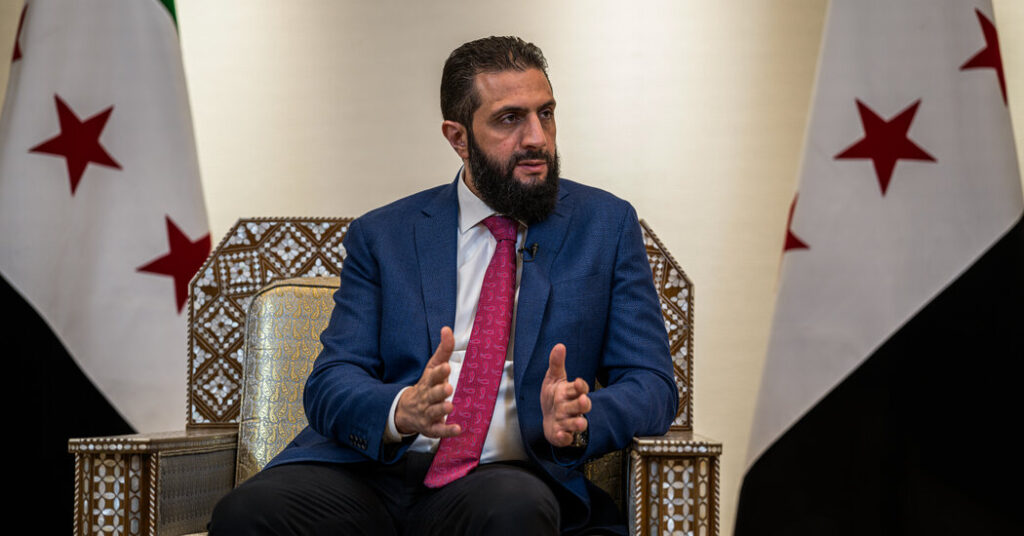President Trump said on Tuesday that he would lift sanctions on Syria, throwing an economic lifeline to a country devastated by nearly 14 years of civil war and decades of dictatorship under the Assad family.
Mr. Trump was expected to meet for the first time with Syria’s new president, Ahmed al-Shara, on Wednesday in Saudi Arabia, where he is making the first major state visit of his second term. Mr. al-Shara led the rebel alliance that ousted President Bashar al-Assad in December.
The U.S. president announced the end of sanctions on Syria as he addressed a business forum in the Saudi capital, Riyadh, where the crowd erupted in cheers and gave him a standing ovation.
The decision marks a sea change for Syria, breaking the economic stranglehold on a country seen as critical to the stability of the Middle East.
“There is a new government that will hopefully succeed in stabilizing the country and keeping peace,” Mr. Trump said. “That’s what we want to see in Syria.”
He said he came to the decision after speaking with Turkey’s president, Recep Tayyip Erdogan, who backed the anti-Assad insurgency, and Saudi Arabia’s crown prince, Mohammed bin Salman. The prince said this week he would work to increase Riyadh’s total pledged investment in the United States during the Trump presidency from $600 billion to the $1 trillion, as Mr. Trump has requested.
“I will be ordering the cessation of sanctions on Syria,” Mr. Trump said, speaking from in front of giant projections of the U.S. and Saudi flags, to an audience seated beneath a massive chandelier. “Oh what I do for the crown prince,” he added, drawing laughter from the enthusiastic crowd.
A White House official said Mr. Trump agreed to “say hello” to the Syrian president while both are in Saudi Arabia on Wednesday, according to the press pool traveling with the U.S. president.
Syria’s foreign minister, Asaad Hassan al-Shaibani, in a statement hailed the move as “a victory for justice and a reaffirmation of Arab unity,” and as “a new beginning on the path to reconstruction.” In the Syrian capital, Damascus, drivers honked their horns in celebration as the news spread.
A face-to-face meeting with Mr. Trump offers Mr. al-Shara a unique opportunity to make his case to a world leader with the power to dramatically shape Syria’s future. It also marks a stunning turnaround for the man who once led a branch of Al Qaeda but broke ties with the jihadist group, seeking to moderate his image in the hope of gaining broader traction.
In the months since a rebel coalition seized control of the Syrian capital, Damascus, and toppled Mr. al-Assad, the United States has kept in place a multilayered sanctions regime that, with the war, has pushed the country to the brink of economic collapse.
Mr. al-Shara and other Syrian officials have argued that the fall of the regime should trigger an end to sanctions, many of which were put in place in response to the Assad dictatorship’s brutal crackdown on an uprising that began in 2011 and morphed into a civil war.
“The sanctions were implemented as a response to crimes committed by the previous regime against the people,” Mr. al-Shara told The New York Times in an interview last month.
Supporters and critics of Mr. al-Shara’s government alike have argued that lifting sanctions is critical to allowing a flow of international aid and investment that could help the country recover from the war.
Several Arab countries had called for sanctions on Syria to be lifted so that they can provide aid and reconstruction assistance, and European countries have lifted some of their sanctions.
But the Trump administration for months kept its distance from Mr. al-Shara’s fledgling administration. Some U.S. officials have expressed deep skepticism of Mr. al-Shara’s motives and his promises to protect religious minorities, pointing to his Islamist orientation and history with Al Qaeda.
The American administration had avoided high-level engagements with Mr. al-Shara’s government and issued demands related to counterterrorism and other issues that it says must be met for sanctions relief to be considered.
The Syrian government has said that some of the demands, such as a ban on foreign fighters in Syria’s government and armed forces, need to be negotiated. But at the same time, it has made moves toward meeting other demands.
Syria recently brought a team of forensic experts from Qatar to search for the remains of Americans killed by the Islamic State group.
And Syrian officials have told American intermediaries that they sought to avoid conflict with all neighboring countries, including Israel, and welcomed American investment.
For months, Syrians and some of their Gulf Arab backers had struggled to get attention from the Trump administration on the sanctions issue.
European leaders, eager to foster stability and prevent new waves of migration, have also pushed for more economic engagement.
Last week, France’s president, Emmanuel Macron, offered a diplomatic boost to Mr. al-Shara, being the first European leader to host the Syrian president in his capital and vowing push to gradually lift European Union sanctions on Syria, provided that the country’s new leaders maintain their path toward stability.
He promised to press the Trump administration to consider a similar approach.
“I told the Syrian president that if he continued to follow his path, we would continue on ours,” Mr. Macron said.

